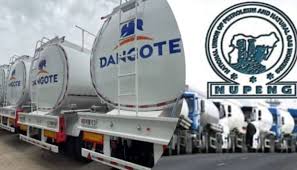The National President of the Independent Petroleum Marketers Association of Nigeria (IPMAN), Abubakar Shettima, has called on the Depot and Petroleum Products Marketers Association of Nigeria (DAPPMAN) and the Nigerian Union of Petroleum and Natural Gas Workers (NUPENG) to settle their disputes with the Dangote Petroleum Refinery through dialogue rather than public altercations or strikes.
Speaking in an interview, Shettima warned that taking grievances to the media or relying on government intervention would not resolve the tension in the downstream oil sector. He advised both associations to seek constructive engagement with the Dangote Group for the overall stability of the market. “My advice to DAPPMAN and NUPENG is they should go to the negotiation table, sit and discuss, because all this going through the media and going to the government cannot help them. They should sit and have a dialogue,” he said.
Shettima explained that the oil and gas industry in Nigeria has entered a new phase following the commencement of operations at the Dangote refinery, Africa’s largest refinery. He urged all players to adapt to changes in the industry rather than resorting to strikes or confrontations. “Changes have already come to the industry and to the country, and whenever there are changes, the only thing we can do as business people is to go and sit down at the negotiation table, not go on strike. We all know that dialogue is the best. Dangote is a Nigerian, and he will listen to them. Let them go and sit together and tell him all that they need,” he added.
The IPMAN president also reminded stakeholders that the downstream sector has been fully deregulated, leaving no legal basis for restrictions on private business operations. “The sector is already fully deregulated. So, you cannot tell an individual that he cannot do this or he cannot do that. He is the owner of his own money. If he says he can give the product free, nobody can prevent him,” Shettima stressed.
Tensions between DAPPMAN, NUPENG, and the Dangote refinery have escalated in recent weeks. DAPPMAN accused the refinery of distorting the market through alleged price undercutting. The controversy deepened after Dangote Refinery announced a price cut for petrol, reducing it from N865 per litre to N841 in the South-West, and N851 in Abuja, Edo, Rivers, Kwara, and Delta states. Depot owners argued that this move was designed to weaken fuel importers whose cargoes had just arrived Nigerian shores. They also alleged that Dangote was selling petrol to international traders in Lome at prices lower than those offered to local marketers.
NUPENG also joined the dispute, accusing Dangote of anti-labour practices. On September 8, the union shut down all fuel depots and the Dangote refinery, claiming that drivers employed for Dangote’s 4,000 compressed natural gas-powered trucks were banned from joining the union. The group threatened to continue withdrawing services if the issues were not addressed.
The dispute has drawn reactions from key industry figures, including billionaire businessman Femi Otedola, who is a close ally of Dangote. Otedola, who founded DAPPMAN in 2002, urged the association to embrace change and innovation rather than resist new realities. He argued that the business model that sustained depot operators in the past had collapsed with the emergence of the Dangote refinery.
“Times have changed. Many of the original players have exited the scene, and those left are clinging to assets that no longer reflect today’s business realities. I advised some of them as far back as last year to sell their depots as scrap while they still had value. Nigeria now has over four million metric tonnes of storage capacity, most of it idle. With the Dangote refinery now supplying fuel locally, the old business model is crumbling,” Otedola said.
He recalled how Zenon Oil, which he established, pioneered the modern diesel business in Nigeria and grew to become the largest supplier. According to him, depots were needed when the market was import-driven and inefficient, but with domestic refining now in place, such facilities are losing relevance. He also highlighted the benefits of the refinery in reducing gridlock in Apapa, Tincan, and Ibafon caused by fuel trucks.
Meanwhile, Dangote has vowed not to allow what he called “oil mafias” to derail his $20 billion investment. The refinery, located in the Lekki Free Zone of Lagos, began operations in 2024 and has a refining capacity of 650,000 barrels per day. It is widely regarded as a game-changer that could end Nigeria’s decades-long dependence on imported refined petroleum products.
Industry analysts have cautioned that if disputes among stakeholders remain unresolved, they could undermine the refinery’s potential to stabilize the market and reduce fuel prices. They emphasize that collaboration, rather than confrontation, will determine how much value the refinery delivers to Nigerians.
